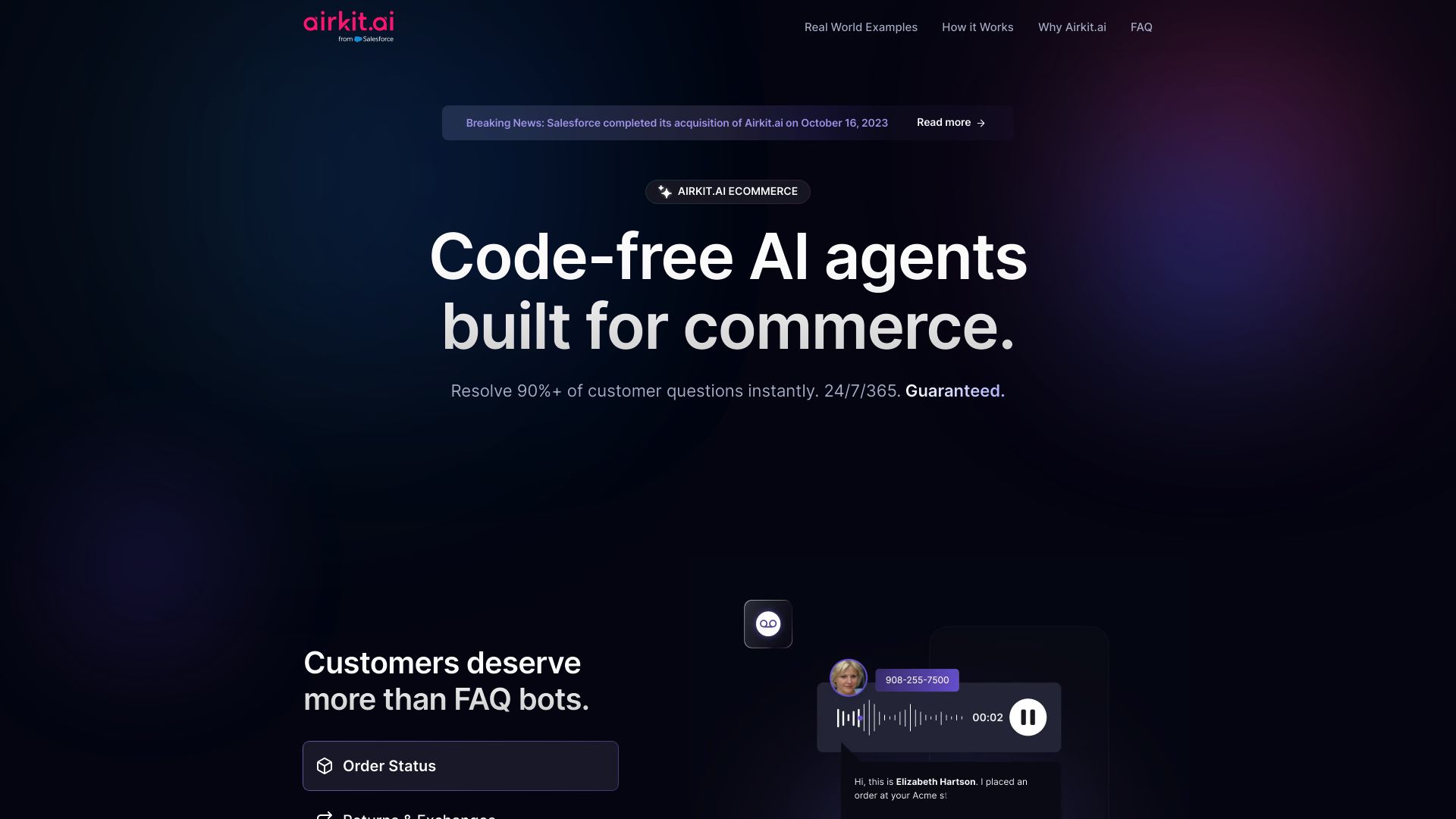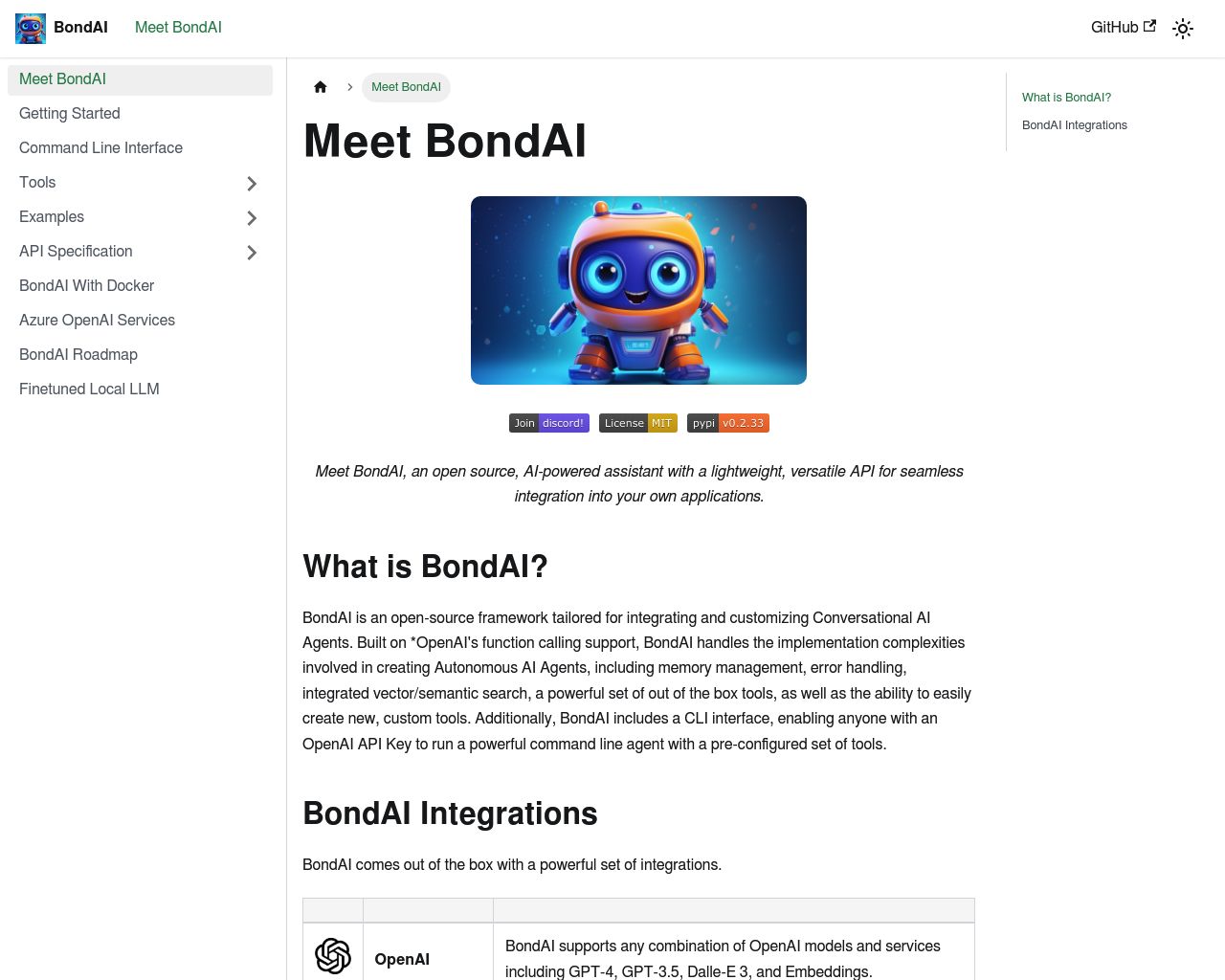Airkit AI vs. BondAI: Comparing AI-Powered Business Solutions
AI-powered customer service and agent development platforms transform how businesses interact with customers and automate complex tasks. This comparison explores Airkit AI’s no-code customer service automation, BondAI’s open-source AI agent framework, and SmythOS’s comprehensive solution. We’ll examine each platform’s strengths, limitations, and unique features to help you choose the best AI solution for your business needs.
Whether you’re a developer seeking advanced AI capabilities, a business leader focused on scalability and security, or a non-technical user looking for accessible tools, this review provides insights to guide your decision-making process in the rapidly evolving world of AI-driven business solutions.
Airkit AI Overview
Airkit AI delivers a powerful no-code platform for building AI-powered customer service agents. Acquired by Salesforce in 2023, Airkit AI integrates seamlessly with Salesforce Service Cloud to automate support tasks across channels.


Airkit AI’s autonomous agents resolve over 90% of repetitive customer inquiries without human intervention. The platform deploys AI agents in hours, requiring no coding skills. Pre-built conversational skills for ecommerce enable rapid implementation of order tracking, returns processing, and product information lookups.
Airkit AI’s autonomous agents resolve over 90% of repetitive customer inquiries without human intervention.
Cloud-based architecture allows Airkit AI to automatically scale during demand spikes. The system continuously learns from interactions to improve resolutions over time. Integration with existing helpdesk and CRM solutions preserves investments in those systems.
While powerful for customer service automation, Airkit AI focuses primarily on ecommerce use cases. Organizations seeking more general-purpose AI agent capabilities may find the platform’s scope limiting. The recent Salesforce acquisition also raises questions about future pricing and standalone availability.
Airkit AI shines in its ability to augment human support teams. Co-pilot mode allows agents to collaborate with AI assistants, improving efficiency. However, advanced features like multi-agent collaboration are not highlighted. The platform emphasizes compliance and control, critical for enterprise deployments handling sensitive customer data.
BondAI Overview
BondAI offers an open-source framework for developing advanced AI Agent Systems. The platform simplifies complex tasks in AI agent creation, including memory management, error handling, and semantic search integration.


BondAI supports cutting-edge AI architectures like ReAct Agents and ConversationalAgents, enabling both individual interactions and multi-agent systems. This versatility allows developers to create AI solutions that can tackle complex tasks through agent collaboration, surpassing single-agent capabilities.
BondAI supports cutting-edge AI architectures… enabling both individual interactions and multi-agent systems. This versatility allows developers to create AI solutions that can tackle complex tasks through agent collaboration.
The framework seamlessly integrates with popular services including OpenAI models, Microsoft Azure, Google Search, and LangChain. This extensive integration empowers developers to build AI applications for diverse use cases, from research and trading to home automation and customer support.
BondAI’s standout feature is its robust memory management system, inspired by the MemGPT paper. Using a tiered approach with core, conversation, and archival memory, BondAI efficiently manages extensive contexts and complex conversations. This structure enhances problem-solving capabilities by allowing AI agents to efficiently store and retrieve information.
BondAI’s standout feature is its robust memory management system… Using a tiered approach with core, conversation, and archival memory, BondAI efficiently manages extensive contexts and complex conversations.
Developers can utilize BondAI through various methods, including a Command Line Interface, Docker containers, or direct integration into codebases. This flexibility allows for quick deployment of pre-configured tools or custom agent development, catering to a wide range of user needs and technical expertise levels.
Feature Comparison
Airkit AI and BondAI offer contrasting approaches to AI agent development, with notable feature gaps in core components and security. Airkit AI provides a no-code platform focused on customer service automation, while BondAI offers an open-source framework for building advanced AI agent systems.
In core components, Airkit AI lacks a visual builder and debug mode, limiting customization options for developers. BondAI, however, supports cutting-edge AI architectures like ReAct Agents and ConversationalAgents, enabling more complex agent interactions. BondAI’s robust memory management system, inspired by MemGPT, outperforms Airkit AI’s more basic learning capabilities.
Security features reveal another gap. While Airkit AI emphasizes compliance and built-in safeguards, it doesn’t explicitly mention features like constrained alignment or IP control. BondAI’s open-source nature may offer more flexibility in implementing custom security measures, but lacks out-of-the-box enterprise-grade security features.
We offer a more comprehensive solution that bridges these gaps. Our visual builder simplifies agent creation while maintaining advanced customization options. Our platform includes robust debugging tools, a sophisticated memory management system, and enterprise-grade security features like constrained alignment and IP control. This combination of user-friendly design and powerful capabilities makes us the superior choice for businesses seeking to harness the full potential of AI agents.
Feature Comparison Table
| Airkit AI | BondAI | SmythOS | |
|---|---|---|---|
| CORE FEATURES | |||
| Visual Builder | ❌ | ❌ | ✅ |
| No-Code Options | ✅ | ❌ | ✅ |
| Explainability & Transparency | ❌ | ✅ | ✅ |
| Debug Tools | ❌ | ✅ | ✅ |
| Multimodal | ❌ | ✅ | ✅ |
| Multi-Agent Collaboration | ❌ | ✅ | ✅ |
| Audit Logs for Analytics | ❌ | ❌ | ✅ |
| Work as Team | ❌ | ✅ | ✅ |
| Agent Work Scheduler | ❌ | ✅ | ✅ |
| SECURITY | |||
| Constrained Alignment | ✅ | ❌ | ✅ |
| IP Control | ❌ | ❌ | ✅ |
| COMPONENTS | |||
| Foundation AIs | ❌ | ✅ | ✅ |
| Huggingface AIs | ❌ | ✅ | ✅ |
| Zapier APIs | ❌ | ✅ | ✅ |
| Classifiers | ❌ | ✅ | ✅ |
| Logic | ❌ | ✅ | ✅ |
| Data Lakes | ❌ | ❌ | ✅ |
| DEPLOYMENT OPTIONS (EMBODIMENTS) | |||
| Deploy as API | ❌ | ✅ | ✅ |
| Deploy as Webhook | ❌ | ✅ | ✅ |
| Staging Domains | ❌ | ❌ | ✅ |
| API Authentication (OAuth + Key) | ❌ | ✅ | ✅ |
| Deploy as Scheduled Agent | ❌ | ❌ | ✅ |
| Deploy as GPT | ❌ | ✅ | ✅ |
| DATA LAKE SUPPORT | |||
| Hosted Vector Database | ❌ | ❌ | ✅ |
| Sitemap Crawler | ❌ | ❌ | ✅ |
| YouTube Transcript Crawler | ❌ | ❌ | ✅ |
| URL Crawler | ❌ | ✅ | ✅ |
| PDF Support | ❌ | ✅ | ✅ |
| Word File Support | ❌ | ✅ | ✅ |
| TXT File Support | ❌ | ✅ | ✅ |
Best Alternative to Airkit AI and BondAI
SmythOS stands out as the superior alternative to Airkit AI and BondAI, offering a comprehensive AI agent development platform that combines ease of use with powerful capabilities. Our drag-and-drop interface simplifies the creation of complex AI workflows, making advanced AI functionalities accessible to users of all skill levels.
Unlike Airkit AI’s limited focus on customer service automation, SmythOS supports a wide range of use cases across industries. Our platform integrates seamlessly with various AI models, APIs, and tools, providing unparalleled flexibility for businesses to create tailored AI solutions. While BondAI offers some advanced AI architectures, SmythOS goes further by combining cutting-edge AI capabilities with a user-friendly interface, enabling rapid development and deployment of sophisticated AI agents.
SmythOS excels in areas where Airkit AI and BondAI fall short. Our robust debugging tools and transparent AI decision-making processes ensure that users can easily troubleshoot and refine their AI agents. Unlike BondAI’s open-source approach, which may lack enterprise-grade features, SmythOS offers a complete ecosystem with built-in security measures, including constrained alignment and IP control, making it ideal for businesses that prioritize data protection and compliance.
SmythOS offers a complete ecosystem with built-in security measures, including constrained alignment and IP control, making it ideal for businesses that prioritize data protection and compliance.
Our platform’s scalability sets it apart from competitors. SmythOS supports multi-agent collaboration and seamless deployment across various environments, from development to production. This flexibility allows businesses to start small and expand their AI capabilities as needed, without the limitations imposed by more rigid platforms like Airkit AI.
By choosing SmythOS, users gain access to a comprehensive suite of features that neither Airkit AI nor BondAI can fully match. From our advanced memory management system to our support for multimodal interactions, SmythOS empowers businesses to create AI agents that can handle complex tasks across text, voice, and visual data. Our platform’s ability to deploy agents as APIs, chatbots, or scheduled tasks further demonstrates its versatility, making it the ideal choice for businesses looking to harness the full potential of AI technology.
Conclusion
Airkit AI and BondAI offer distinct approaches to AI agent development, each with its own strengths and limitations. Airkit AI excels in customer service automation for ecommerce, providing a no-code platform that rapidly deploys AI agents. BondAI, as an open-source framework, offers developers flexibility to build advanced AI systems with cutting-edge architectures.
However, SmythOS emerges as the superior solution, bridging the gaps between these platforms and offering a more comprehensive set of features. Our visual builder combines the ease of use found in Airkit AI with the advanced capabilities of BondAI, allowing users to create sophisticated AI agents without extensive coding knowledge.
Unlike Airkit AI’s focus on ecommerce, SmythOS provides versatility across industries. Our platform supports multimodal interactions, advanced problem-solving capabilities, and seamless integration with various APIs and data sources. This flexibility enables businesses to tackle complex tasks and automate workflows beyond customer service.
While BondAI offers powerful memory management, SmythOS takes it further with a robust system that efficiently handles extensive contexts and complex conversations. Combined with our debugging tools, multi-agent collaboration features, and enterprise-grade security measures, SmythOS provides a more complete package for businesses seeking to harness AI’s full potential.
If you’re ready to revolutionize your business processes with AI, explore our diverse range of AI-powered agent templates to kickstart your journey. For those eager to experience the power of SmythOS firsthand, we invite you to create a free SmythOS account and start building AI agents today. Unlock the future of AI-driven automation and innovation with SmythOS.
Last updated:
Disclaimer: The information presented in this article is for general informational purposes only and is provided as is. While we strive to keep the content up-to-date and accurate, we make no representations or warranties of any kind, express or implied, about the completeness, accuracy, reliability, suitability, or availability of the information contained in this article.
Any reliance you place on such information is strictly at your own risk. We reserve the right to make additions, deletions, or modifications to the contents of this article at any time without prior notice.
In no event will we be liable for any loss or damage including without limitation, indirect or consequential loss or damage, or any loss or damage whatsoever arising from loss of data, profits, or any other loss not specified herein arising out of, or in connection with, the use of this article.
Despite our best efforts, this article may contain oversights, errors, or omissions. If you notice any inaccuracies or have concerns about the content, please report them through our content feedback form. Your input helps us maintain the quality and reliability of our information.
